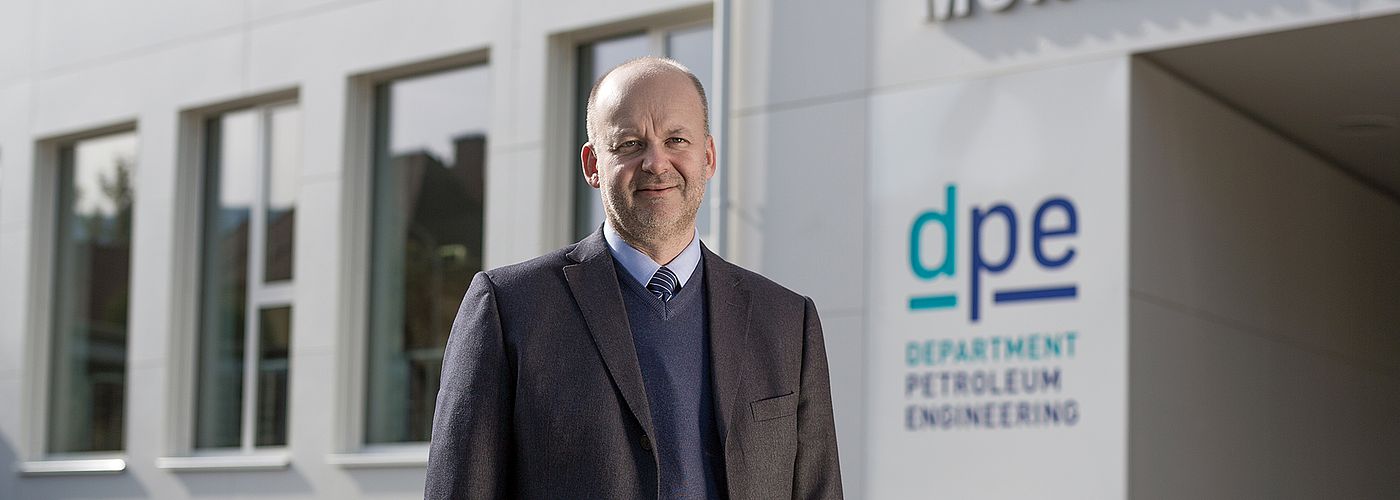Welcome to DPE
Since January 1st 2015, the Chairs Drilling and Completion Engineering, Petroleum and Geothermal Energy Recovery and Reservoir Engineering form the Department Petroleum Engineering DPE headed by Univ.-Prof. Dr.mont. Gerhard Thonhauser.
Now there is a unified competence center for both students as well as industry. Students know where to go to take part in all petroleum engineering lectures, exams and practicals. On the other hand, the department acts as a one-stop-shop for industry connecting all petroleum-related research areas within Montanuniversität.

Head of DPE Univ.-Prof. Dipl.-Ing. Dr.mont. Gerhard Thonhauser
In conversation with the head of DPE, Univ.-Prof. Dr.mont. Gerhard Thonhauser
Discussing the status of the oil market today, trends and key challenges in the future – both for industry and university – as well as solutions on the roadmap of DPE to meet the needs of students as well as industry partners.
Our Core Values
Scientific excellence in drilling, production and reservoir engineering.
Improvement of efficiency, safety of oil and gas exploration as well as production along the entire life cycle of a field.
Work in close relation with industry and international university partners.
Our Mission
Robust models based on physics will drive data science combined with the capability to perform field measurements to characterize the environment covering the entire life cycle of the field.
What are the key challenges and trends of the petroleum industry today and in the next decade?
Thonhauser: First of all, the oil and gas industry is shifting from a predominantly risk-based industry to a cost-driven industry. This move started with the development of shale gas, which was seen as a mainly US-specific development. Because of the low oil price – which may stay as low for the next few years – this change has now also reached all of today’s oil industry.
In the past decades, the entire industry saw no need to increase efficiency like other industries did (e.g. the automotive industry). Concepts to use sensor measurements, real time data processing and closed control loops for heavy machinery to improve their efficiency and reliability have not been adopted. This will change in the near future. The concept of digital oilfield has to be revised and thoroughly implemented as quickly as possible to increase efficiency and provide a safe work environment.
Is improving existing solutions of today enough or does industry need disruptive technology to meet the challenges of the future?
Thonhauser: Both are true. The steady improvement of existing solutions has to be part of daily work flows and paves the way for an efficiency culture in an organization. But any technology or process reaches a capability limit, which then asks for step change – so-called disruptive technologies. The use of available data to measure performance plays a major role in continuous improvement and allows identifying areas where step changes are necessary.
In one of our scientific focal areas “Model Based Data Science” we propose to improve heavy machinery used in all parts of the oil and gas industry using applied data science – which is based on leading-edge, realistic models – to understand machinery and the associated processes based on their physical behavior. We turn them into cyber physical systems. This allows us to link the traditional heavy industry with the web age!
Where do you see DPE in 10 years generally based on the history and recent changes?
Thonhauser: Montanuniversität Leoben (MUL) shall be recognized as the academic institution having the leading Petroleum Engineering Department in terms of education, research and as a work place within the next 5 years. Our goals are:
- Graduates from DPE are preferred by industry.
- Scientists and technology experts want to work and teach at DPE.
- Industry seeks DPE as a preferred research partner.
DPE will be the “one-stop-shop” for petroleum engineering solutions within MUL cooperating and integrating other disciplines at MUL in order to solve research challenges and to cooperate in education.
In which areas can DPE provide solutions? Academic education and/or scientific and industry research?
Thonhauser: We combine different areas as efficiently as possible in so-called “Scientific Focus Areas” to address the problems of today and the future. We set up research groups in “Well Integrity” and “Drilling Process Dynamics” as examples. At the same time, we have to stay open and push for a steady development of expertise to cope with the permanently growing and changing requirements in the academic field and the industry.
Why should a young person choose to study petroleum engineering, and why especially at MUL?
Thonhauser: We offer an extraordinary education in an area, which prepares graduates to work in a highly international work environment. This can be the petroleum industry, but also other industries using similar technology. We welcome energetic young people with entrepreneurial spirit to work in a team of top scientists and extraordinary graduates. We cooperate in executing leading-edge projects as well as providing excellent lectures as part of the Petroleum Engineering study program to educate highly performing graduates with top career opportunities.
Univ.-Prof. Dipl.-Ing. Dr.mont. Gerhard Thonhauser
Head of Department Petroleum Engineering
Professor at the Chair of Drilling and Completion Engineering